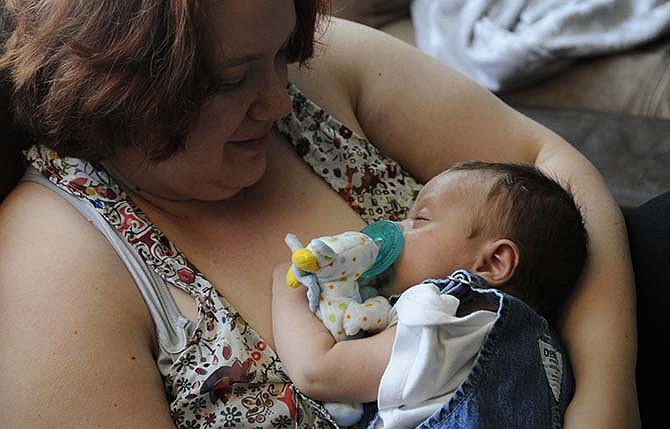When she returned to work after having her first child, Ashley Boyce needed to maintain pumping her breast milk to ensure she could last a year supplying food to her daughter, Alyce.
The first day back as an assistant manager at Central Bank in Holts Summit was emotional, Boyce said, but she was comforted by the sight inside a break room — complete with table, chair, lamp and book — designated for her pumping privacy. She marks the break room door “occupied†two to three times a day for 15 minutes.
Boyce has developed a routine to ensure her daughter has the freshest milk possible. Daily, she packs a list of items essential for her pumping: her pump, bottles, a cooler and more.
“You have to be dedicated to breastfeeding,†Boyce said. “It’s like a part-time job.â€
More mothers in Cole County, Missouri and nationwide and choosing to breastfeed. Melinda Ridenhour, director of nutrition services at the Cole County Health Department, said in her 18 years working for the Women, Infant and Children (WIC) Food and Nutrition Program in the county, mothers using WIC has gone up 47 percent.
In 2010, WIC mothers initiating breastfeeding was at 62.8 percent. Today, that rate is 67.2 percent. Data shows not only are more mothers choosing to breastfeed, but they are doing so for longer periods of time. Six years ago, the 6-month duration rate was seven percent and the 12-month duration rate was one percent.
Those figures have increased to 18 percent and 13 percent, respectively.
Ridenhour attributes the spike in rates to support for mothers at the local hospitals — St. Mary’s Hospital and Capital Region Medical Center — as well as area businesses employing breastfeeding mothers.
“Women can start out wanting to breastfeed, but if the barriers are too great and their support systems aren’t there … she’s not going to be able to breastfeed past (her goal),†Ridenhour said. “I think it’s about removing those obstacles the best we can.â€
Brandice Nittler, a mother of two in Holts Summit, hopes to breastfeed her son for 18 months — six months past the one-year recommendation from the World Health Organization.
Every mother’s experience is different, Ridenhour said, and making the decision to quit breastfeeding is up to the mother and baby, alike. Sometimes a mother’s milk supply will decrease as her baby gets older, and their food can be supplemented with formula or solid food, depending on a baby’s age.
Nine months after giving birth to Alyce, Boyce became worried when her supply decreased, but she said it was her body’s way of signaling breastfeeding would come to an end.
Becky Schwaller, lactation consultant and registered nurse with St. Mary’s Hospital, said if it’s possible and desired by both mother and child, mothers can breastfeed for two or three years. That can have added health benefits.
She said research studies have shown that a mother’s breast milk can help cure her baby of illness. As a baby suckles during a feeding, she said the mother’s bodies detects bacteria or viruses and produces milk to help cure her child.
With that knowledge, Nittler, a 28-year-old stay-at-home mom, established her goal.
“Your milk changes as the babies get older and the antibodies change to help them later on in life to not be so susceptible to different illnesses,†she said. “I want to make sure he gets all the nutrients he needs.â€
Research has also shown, Schwaller said, that breastfed babies have lower rates of ear infection, gastrointestinal issues, asthma, allergies, Type 1 and 2 diabetes, obesity and sudden infant death syndrome. These babies also tend to have higher cognitive abilities than babies who are strictly fed with formula.
Mothers also receive health benefits through breastfeeding, she added. While breastfeeding, a hormone is released that helps clamp down the uterus and can lower the amount of blood loss. It also lowers a mother’s risk of breast and ovarian cancer and osteoporosis later in life. Because it takes about 500 extra calories daily to produce milk, breastfeeding can help moms lose weight, Schwaller said.
The decision to breastfeed can be a financial one for families, Schwaller said, adding they can save $1,700-$2,000 on what they might have spent on formula.
Though they saw the health benefits, Nittler and her husband concluded she would breastfeed their children (they also have a three-year-old daughter) after seeing the infant formula price tags. Pregnant with their first child, the couple was homeless for some time.
“We finally got a place before I had her, and after seeing the cost of formula, it made us go toward breastfeeding,†she said.
To succeed with breastfeeding, Angie Stonner, a lactation consultant at Capital Region Medical Center, said physical touch between mom and baby is crucial in the very first moments of life. If a mom can breastfeed within the first hour after giving birth, Stonner said mom and baby can set up a good experience.
“One thing that is very important right after delivery is that babies and moms go skin to skin, which means bare chest to bare chest inside mom’s gown,†she said.
Ridenhour said some mothers choose to feed their babies formula milk after a traumatic delivery in which the baby was separated from the mother and given a bottle for its first feeding. Sometimes, mothers have hormonal issues that prevent them from breastfeeding or it simply doesn’t work out.
She said she reminds moms that formula “is not an evil substance.â€
“Is breast milk the best of the best? Yes, it is,†she said. “But babies thrive very well on formula and do quite nicely with it.â€
For moms new to breastfeeding, Boyce said to never give up.
“Don’t go into it lightly. It’s a lot to take on and stick with it,†she said. “Just keep at it. Know that you are going to be that child’s food source 24/7, and that is a lot to take on.â€

